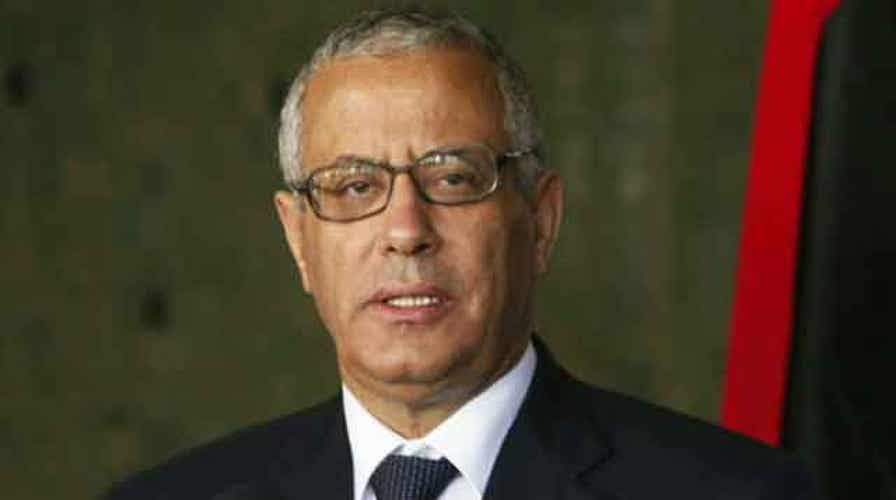Libyan Prime Minister Ali Zidan has been freed after armed kidnappers abducted him earlier Thursday from a hotel and took him to an undisclosed location in apparent retaliation for a U.S. special forces' raid that seized a Libyan Al Qaeda suspect from the streets of Tripoli.
Government Spokesman Mohammed Kaabar told the news agency LANA that Zidan has been "set free" and was on his way to his office on Thursday.
Zidan later arrived at the office and appeared at a Cabinet meeting aired live on Libyan TV. He thanked those who helped free him but provided no details and avoided pointing fingers at those behind the abduction.
"We hope this matter will be treated with wisdom and rationality, far from tension," he said. "There are many things that need dealing with."
A militia commander affiliated with the Interior Ministry told a private Libyan television station that the prime minister was freed when members of a Tripoli-based militia stormed the house where he was held hostage.
Haitham al-Tajouri, commander of the so-called "Reinforcement Force," told Al-Hurrah television that his men exchanged fire with the captors but that Zidan was not hurt.
"He is now safe in a safe place," he said. His account could not be independently verified.
Hours earlier, gunmen broke into the luxury Corinthia Hotel in downtown Tripoli where Zeidan lives and abducted him and two of his guards, a Libyan official told the Associated Press. The guards were beaten but later released, according to the official, who requested anonymity on the grounds that he was not authorized to discuss the incident.
The abduction came after Saturday's U.S. special forces raid that captured Abu Anas al-Libi, a suspected militant wanted by America for more than a decade over the 1998 bombings of U.S. embassies in Africa.
Some militia groups angry over the raid had hinted at retaliation at U.S. and other foreign interests and have lashed out at the government, accusing it of colluding with Washington, the Associated Press reported.
On Tuesday, Zidan said the Libyan government had requested that Washington allow al-Libi's family to establish contact with him. Zidan insisted that Libyan citizens should be tried in their homeland if they are accused of crimes, stressing that "Libya does not surrender its sons."
Zidan's abduction came hours after he met Wednesday evening with al-Libi's family.
The abduction reflected the weakness of Libya's government, which is virtually held hostage by powerful militias, many of which are made up of Islamic militants.
Suspicion of who is behind the kidnapping fell on two state-affiliated agencies connected to militias -- "the Revolutionaries Operation Room" and "the Anti-Crime Department, which have been set up by Nouri Boushameen, president of the National Congress, or parliament.
Boushameen later sought to distance himself from the kidnapping, telling a news conference that members of the two agencies who took part in the abduction would be punished.
He said he visited the prime minister while in captivity and promised to resolve the crisis.
Witnesses told The Associated Press that up to 150 gunmen drove up in pickup trucks and laid siege to the Corinthia Hotel before daylight Thursday. A large group of them entered the building, some stayed in the lobby while others headed to the 21st floor where Zidan was staying.
The gunmen scuffled with the prime minister's guards before they seized him and led him out at around 5.15 a.m., said the witnesses, speaking on condition of anonymity because they feared for their own safety. They said Zidan offered no resistance while he was being led away.
In a sign of Libya's chaos, Zidan's seizure was depicted by various sources as either an "arrest" or an abduction.
That is because the militias are interwoven in Libya's fragmented power structure. With the police and army in disarray, many are enlisted to serve in state security agencies, though their loyalty is more to their own commanders than to government officials and they have often intimidated or threatened officials. The militias are rooted in the brigades that fought in the uprising that toppled autocrat Muammar Qaddafi in 2011, and are often referred to as "revolutionaries."
Mohammed Shaaban, Corinthia's security manager, said the gunmen showed the hotel's management an arrest warrant they claimed had been issued by the public prosecutor.
The public prosecutor's office said it had issued no warrant for Zidan's arrest.
A statement on the government's official website said Zidan was taken at dawn to an "unknown location for unknown reasons" by a group believed to be "revolutionaries" from a security agency known as the Anti-Crime Committee. The Cabinet held an emergency meeting Thursday morning, headed by Zidan's deputy, Abdel-Salam al-Qadi.
Abdel-Moneim al-Hour, an official with the Anti-Crime Committee, told The Associated Press that Zidan had been arrested on accusations of harming state security and corruption. The public prosecutor's office said it had issued no warrant for Zidan's arrest.
The State Department was looking into reports of the abduction and was "in close touch with senior U.S. and Libyan officials on the ground,'' spokeswoman Jen Psaki said.
U.S. Secretary of State John Kerry said at a news conference in Kuala Lumpur, Malaysia, "It is clearly a situation that is still evolving. The Libyan prime minister to our understanding has been released. It our understanding that there has been no statement issued yet as to the who, what, why and how."
The Associated Press contributed to this report.

